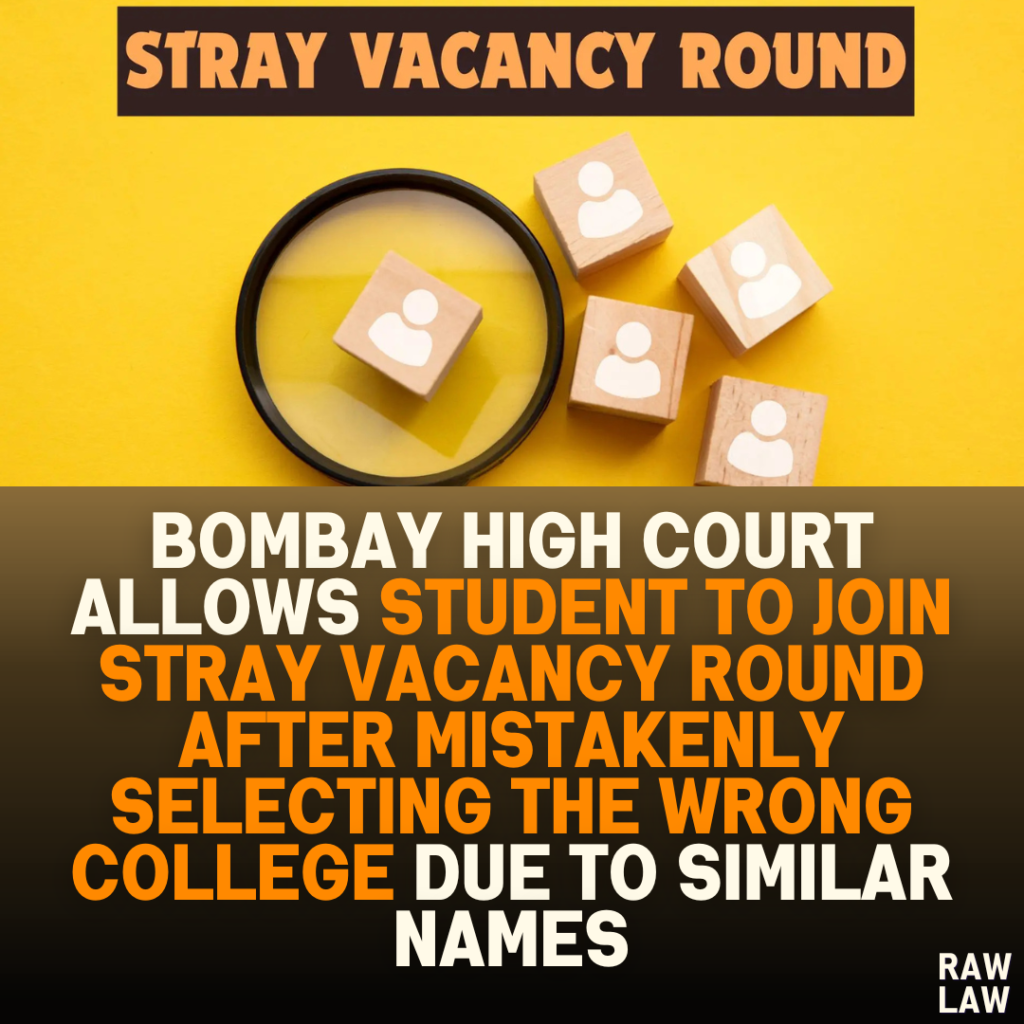Court’s Decision:
The Bombay High Court, by way of ad-interim relief, directed the Respondent-State CET Cell to allow the petitioner to participate in the stray vacancy round. This decision was based on the peculiar facts of the case and the inadvertent error made by the petitioner in filling out preferences during CAP round 3. The court made it clear that this relief was specific to the case’s facts and that the petitioner would not be entitled to claim any equity based on this interim order. Her admission, if any, would be subject to the final outcome of the petition.
Facts:
The petitioner, a medical aspirant, appeared for NEET-UG 2024 and scored 641 out of 720 marks, ranking at Serial No. 13448 under the General Merit Category. She had initially been allotted a seat in the Government Medical College, Kudal, Sindhudurg under the 85% State Quota in CAP round 1. She then participated in CAP round 2, securing a seat in Government Medical College, Ratnagiri, and continued to pursue betterment in CAP round 3. During this round, she mistakenly selected “Government Dental College, Chhatrapati Sambhajinagar” instead of “Government Medical College” under the same name due to a drop-down menu error. The petitioner sought relief from the court to participate in the stray vacancy round, claiming the mistake was inadvertent.
Issues:
The primary issue was whether the petitioner should be permitted to participate in the stray vacancy round after mistakenly selecting a dental college instead of a medical college during CAP round 3.
Petitioner’s Arguments:
The petitioner argued that she had consistently aimed to secure admission to a medical college and had never intended to join a dental course. The mistake arose due to the similar names of the medical and dental colleges in Chhatrapati Sambhajinagar and a drop-down menu error in the online portal. As a result, the petitioner sought the court’s intervention to allow her to participate in the stray vacancy round.
Respondent’s Arguments:
The respondent-State CET Cell contended that the admission process’s rules did not permit students allotted a seat in any CAP round to participate in the stray vacancy round. Since the petitioner had already been allotted a seat, she was ineligible for further participation.
Analysis of the Law:
The court examined the admission rules for CAP rounds and the restrictions regarding participation in the stray vacancy round. It was noted that once a student is allotted a seat in any CAP round, they are generally not eligible for the stray vacancy round. However, the court also considered the facts peculiar to this case, especially the unintentional error by the petitioner.
Precedent Analysis:
The court referred to a similar case, Punam Laxman Sherkhane v. The Union of India Through Directorate General of Health Services, where the Aurangabad Bench granted similar relief in identical circumstances. In that case, the court allowed the petitioner to participate in the stray vacancy round despite being allotted a seat earlier.
Court’s Reasoning:
The court found that the petitioner’s error in selecting a dental college was inadvertent and based on a genuine mistake due to the identical names of the medical and dental colleges. Given that the petitioner had no intention of joining a dental college and had consistently sought admission to a medical course, the court ruled that her career should not be jeopardized due to this mistake. The court reasoned that equity demanded allowing the petitioner to rectify her error and participate in the stray vacancy round.
Conclusion:
The court granted ad-interim relief to the petitioner, directing the Respondent-State CET Cell to take necessary steps to allow her participation in the stray vacancy round. The court emphasized that this order was based on the unique facts of the case and would not create a precedent for others. The petitioner’s ultimate admission would remain subject to the petition’s final outcome.
Implications:
This decision highlights the court’s willingness to consider the peculiar facts of each case, particularly in cases where genuine mistakes occur during administrative processes. It underscores the importance of ensuring that procedural errors do not unfairly disrupt a student’s educational aspirations. The ruling may prompt authorities to reconsider how errors in admission processes are handled, especially when such mistakes are inadvertent.




Pingback: Bombay High Court Upholds Denial of Purchase Preference in Tender Process for MSE Due to Procedural Non-Compliance – 'Affirmative Action Essential, Judicial Intervention Limited to Cases of Arbitrariness or Statutory Breach'" - Raw Law